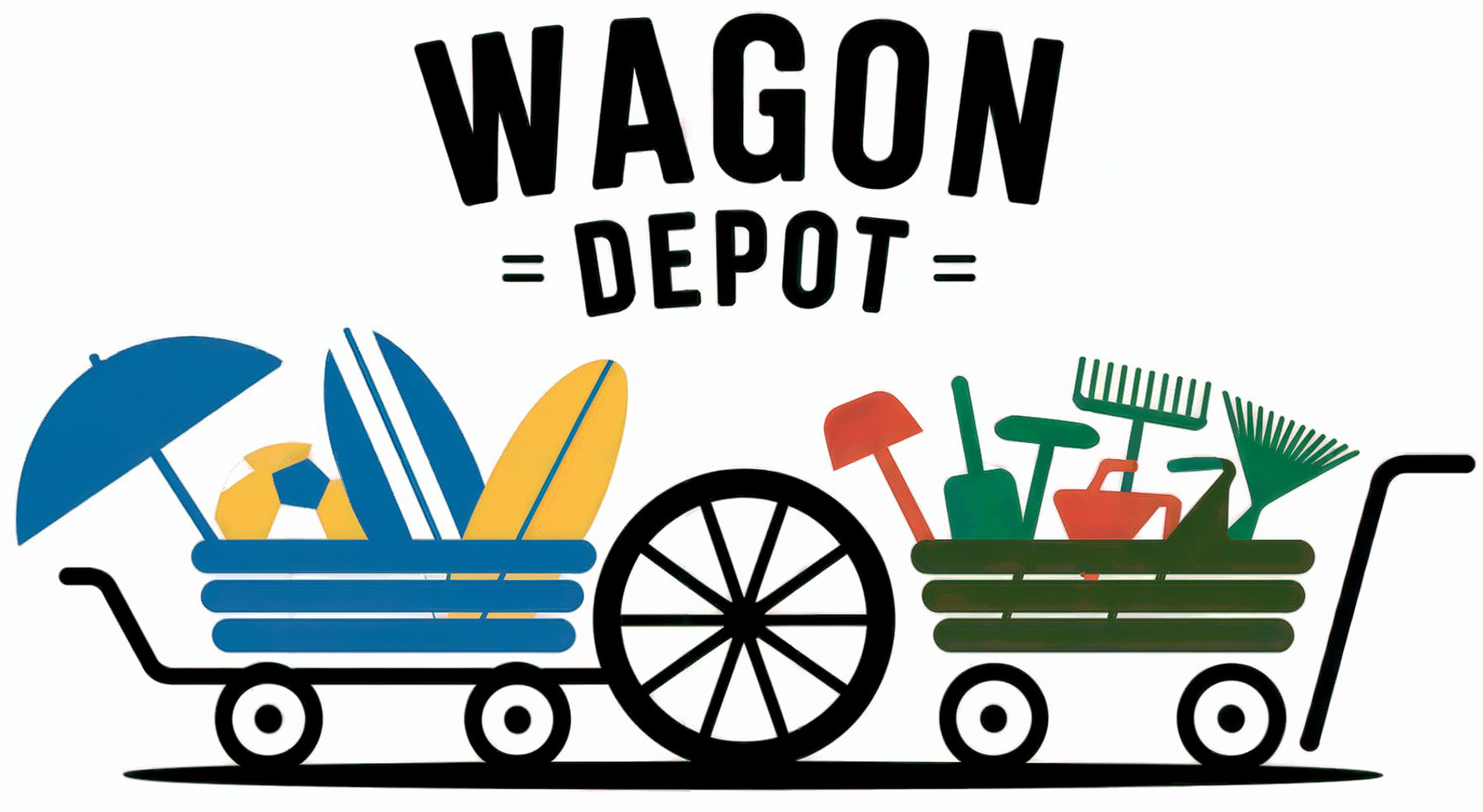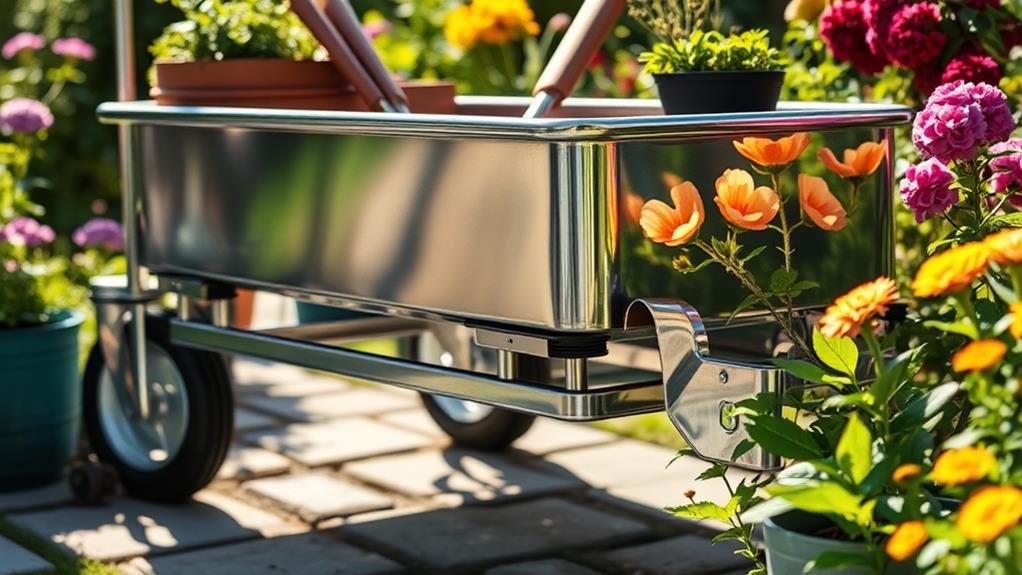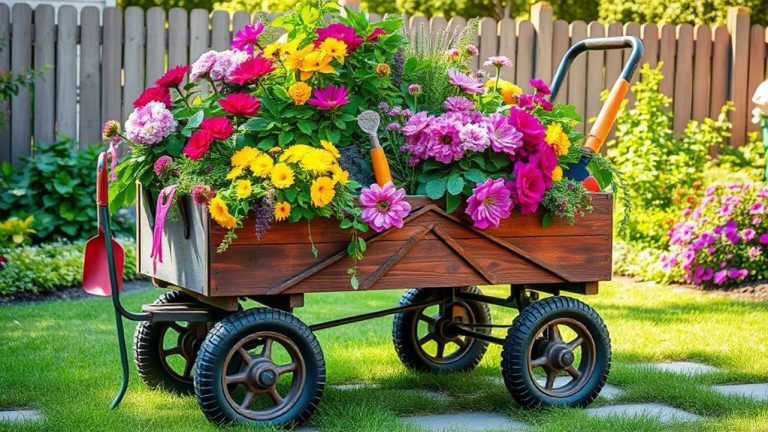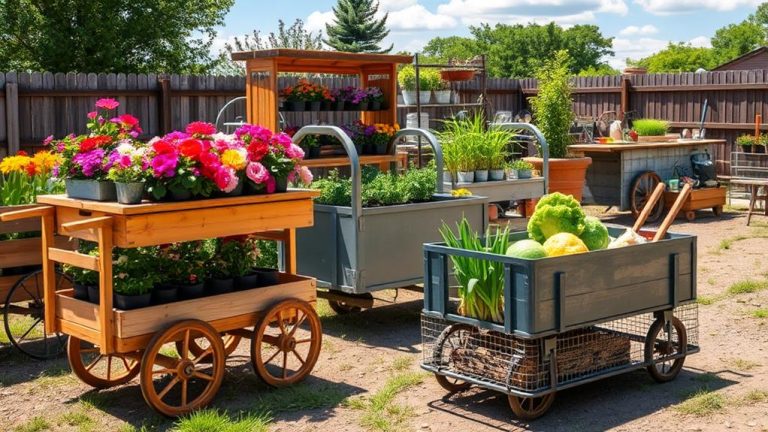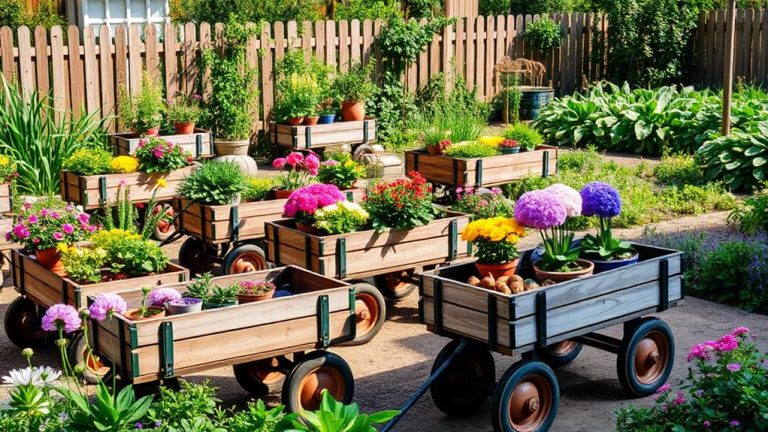A truly rust-resistant garden cart combines effective material choice, protective coatings, and regular maintenance. Look for stainless steel or treated aluminum, as these can last considerably longer than untreated steel. Protective coatings like powder coating or galvanization help shield metal from moisture and oxygen, which are key rust culprits. Furthermore, keeping your cart clean and dry will prevent rust formation. You should regularly inspect for any scratches and apply rust-resistant paint as needed to maintain its integrity. Comprehending these elements can guarantee you're making the best investment for your gardening experience, and exploring deeper will provide even more insights.
Understanding Rust Resistance
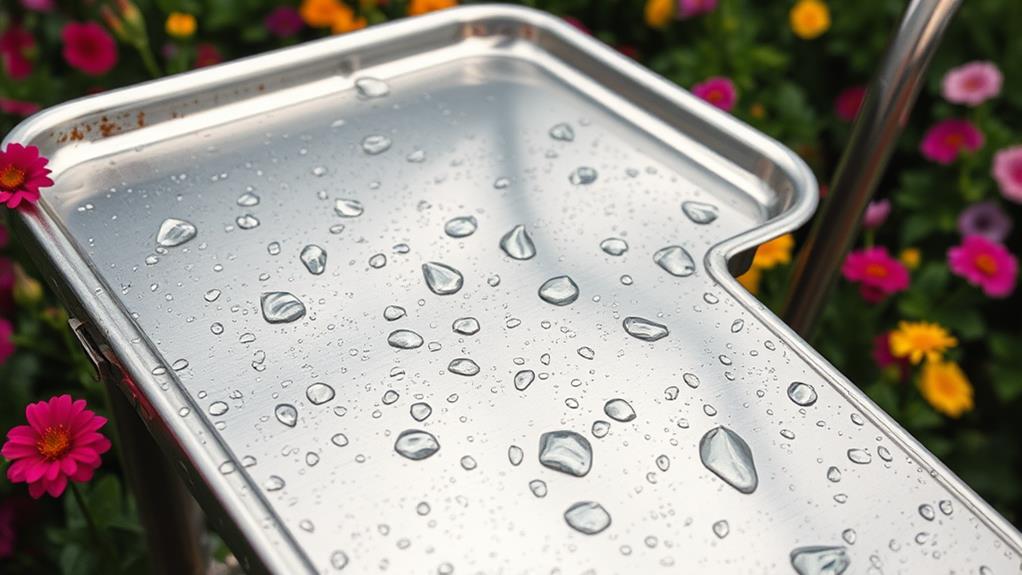
In relation to garden carts, grasping rust resistance is vital for ensuring their longevity and performance. Rust formation occurs when metal reacts with moisture and oxygen, leading to corrosion that can compromise your cart's structural integrity. Recognizing the environmental factors at play is fundamental. For instance, if you live in a humid climate, your cart's exposure to moisture increases the likelihood of rust.
You should likewise consider how frequent exposure to elements like rain or dew can exacerbate rust formation. By choosing a garden cart with protective coatings or materials designed to resist corrosion, you can considerably extend its lifespan. Regular maintenance, including cleaning and drying your cart after use, can further prevent rust from taking hold.
Moreover, storing your cart in a sheltered area away from direct moisture can mitigate the impact of environmental factors. Remember, the right choice and care can make all the difference. By prioritizing rust resistance, you'll not only improve your cart's performance but additionally enjoy the freedom of maintaining a reliable tool in your gardening endeavors.
Common Materials Used
When selecting a garden cart, you'll encounter a variety of materials, each with its own implications for rust resistance and durability. Steel is a common choice, known for its strength and longevity. Nevertheless, standard steel can rust easily without proper treatment. Stainless steel, in contrast, offers significant material advantages because of its inherent corrosion resistance, which makes it a preferred option for those seeking durability with minimal maintenance.
Aluminum is another popular material; it's lightweight and doesn't rust, making it great for maneuverability in your garden. Although it may not be as strong as steel, its natural resistance to corrosion can be a significant turning point for your gardening tasks.
Lastly, plastic garden carts are likewise available. They're resistant to rust and corrosion prevention, but they may lack the structural integrity you'd find in metal options.
Ultimately, the choice of material can greatly affect your garden cart's lifespan. By comprehending these common materials and their properties, you can make an informed decision that aligns with your gardening needs and desires for a reliable, rust-resistant solution.
Protective Coatings Explained
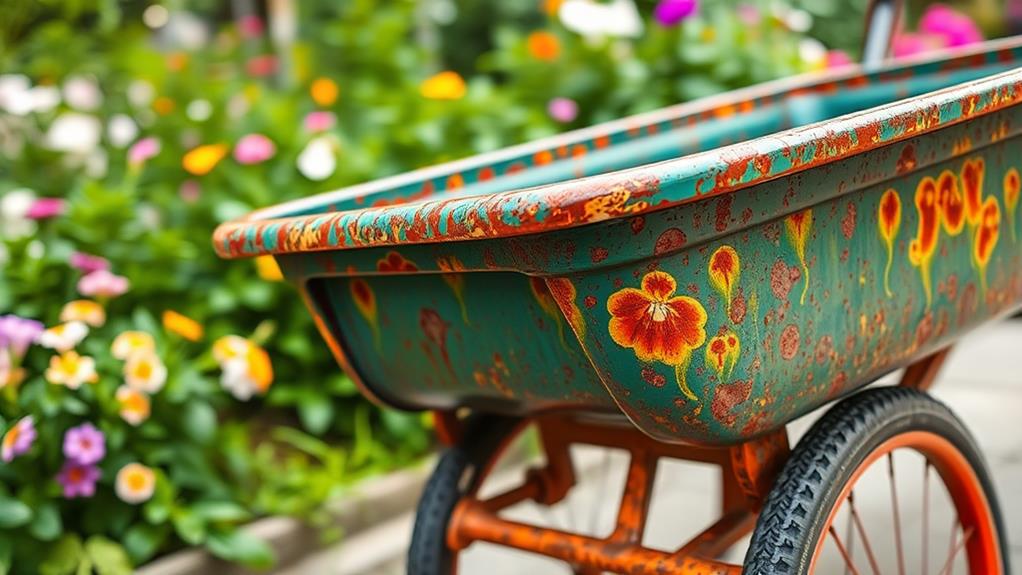
Comprehending protective coatings is essential for enhancing the longevity and rust resistance of your garden cart. These coatings, often referred to as protective finishes, serve as the first line of defense against environmental elements that cause corrosion. When you choose a garden cart, look for options that feature high-quality coatings designed particularly for corrosion prevention.
There are several types of protective finishes available on the market. Powder coating, for instance, offers a durable, chip-resistant layer that's baked onto the metal, providing excellent protection against moisture and rust. Similarly, galvanization involves applying a zinc layer that serves as a barrier, sacrificing itself to protect the underlying metal.
If you're eager on maintaining your garden cart's appearance and functionality, consider regular inspections and touch-ups of these coatings. Even the best finishes can wear over time, especially if exposed to harsh weather conditions. By grasping how protective coatings work, you empower yourself to make informed choices about your garden cart, ensuring it remains a reliable companion for years to come. Remember, a little care goes a long way in preserving your investment.
Design Features That Matter
Choosing the right design features for your garden cart can make a significant difference in both its functionality and durability. One of the key aspects to contemplate is the inclusion of ergonomic handles. These handles not merely provide a comfortable grip but also reduce strain on your back and arms, allowing you to maneuver your cart with ease. When you're spending hours in the garden, this design feature becomes invaluable.
Another critical factor is wheel durability. The wheels should be made from high-quality materials that can withstand various terrains, whether you’re rolling over gravel, soil, or grass. Look for large, sturdy wheels with a good tread pattern, as they’ll provide better traction and stability. This not only improves your cart’s performance but also guarantees it can handle heavy loads without compromising its structural integrity. Additionally, choosing wheels with shock absorption features can make a significant difference when navigating uneven surfaces, ensuring a smoother ride. The best collapsible festival wagon should have reinforced wheel axles to prevent bending or breaking under pressure, especially when carrying bulky items. Investing in a wagon with durable, all-terrain wheels will enhance its longevity and reliability for various outdoor adventures. Moreover, it’s essential to consider the overall design and functionality of the wagon, as this can greatly impact its versatility. The best spacesaving utility wagons often feature foldable designs that allow for easy storage when not in use, making them perfect for families or individuals who enjoy outdoor activities but have limited space. Additionally, many of these wagons come equipped with extra features like cup holders, adjustable handles, and removable liners, providing convenience for all your outdoor needs. Investing in a wagon that combines durability with practical design will ensure that you’re well-prepared for any adventure that comes your way.
Additionally, reflect on the overall weight distribution of your garden cart. A well-balanced design will prevent tipping, making it safer and more efficient to use. By focusing on these vital design features, you're not merely investing in a garden cart; you're investing in a tool that offers both freedom and functionality in your gardening endeavors.
Maintenance Tips for Longevity
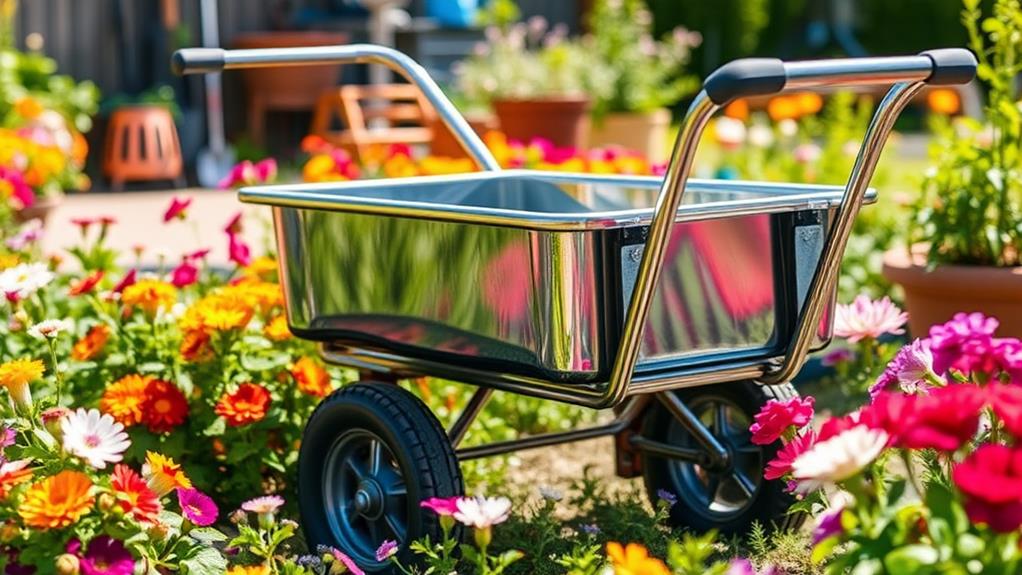
How can you guarantee your garden cart lasts for years to come? Proper maintenance is key to ensuring its longevity, especially regarding rust resistance. Here are some crucial tips to keep your cart in top shape:
- Clean Regularly: After each use, remove dirt and debris. A simple wash with soap and water can prevent corrosion.
- Dry Thoroughly: Always dry your cart completely before storing it away. Moisture is a rust's worst enemy.
- Inspect for Damage: Regularly check for scratches or chips in the paint. If found, touch them up with rust-resistant paint to protect the metal underneath.
- Store Properly: Use outdoor storage solutions that shield your cart from rain and snow. A quality cover can extend its life considerably.
Comparing Rust-Resistant Brands
In the domain of selecting a garden cart, the variety of rust-resistant brands on the market can be overwhelming. You're likely to encounter a range of materials and designs, each claiming to offer superior rust resistance. Key players often incorporate brand innovations like powder-coated finishes or stainless steel frames that improve durability. These advancements not only resist rust but also boost the aesthetic appeal of your garden cart.
When comparing options, it's crucial to evaluate customer feedback. Reviews can provide insights into real-world performance, durability, and ease of use. Look for patterns in feedback regarding how well a cart withstands the elements over time. Some brands may excel in specific conditions, whereas others might be more versatile.
Additionally, don't overlook warranty and customer service offerings. A robust warranty suggests confidence from the manufacturer in their product's longevity. By assessing these factors, you can make an informed decision that aligns with your needs and desire for a reliable garden cart. In the end, selecting the right brand can give you the freedom to enjoy your gardening endeavors without the worry of rust compromising your equipment.
Real-Life Performance Reviews
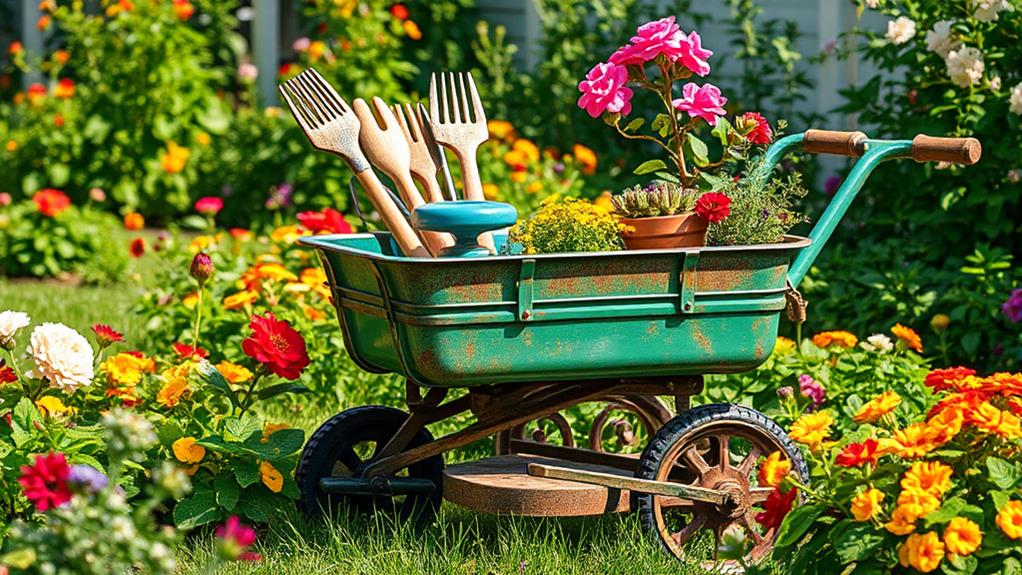
When you assess the real-life performance of garden carts, consider the material durability, weather resistance, and longevity under daily use. These factors play an essential role in determining how well a cart withstands the elements and heavy loads over time. By examining user experiences and expert reviews, you can make an informed decision on which rust-resistant cart truly stands the test of time.
Material Durability Assessment
Evaluating the material durability of garden carts reveals significant insights into their long-term performance in real-world conditions. When you choose a garden cart, comprehending the different material types and their resistance to corrosion factors is essential. After all, the materials used can greatly impact how well your cart withstands the test of time and environmental challenges.
Here are some key considerations to keep in mind:
- Steel vs. Aluminum: Steel offers strength but may rust without proper treatment, whereas aluminum is lightweight and naturally resistant to corrosion.
- Finish Quality: A high-quality powder coating can provide an extra layer of protection against moisture and scratches.
- Weld Integrity: Strong welds are significant; weak joints can lead to structural failure, especially under heavy loads.
- Wheel Material: Solid rubber wheels resist wear and tear better than plastic, particularly on uneven terrain.
Weather Resistance Testing
Garden carts' ability to withstand various weather conditions can make or break their longevity and usability. When you're selecting a cart, it's vital to take into account how well it can handle corrosion factors like moisture, salt, and temperature fluctuations. You'll want to look for materials that resist rust and deterioration, ensuring the cart remains functional through rain, snow, or harsh sun.
Real-life performance reviews highlight the importance of testing against environmental influences. For instance, a cart exposed to coastal climates may face accelerated rusting as a result of salty air. Conversely, carts used in drier regions might experience less corrosion but could still suffer from heat-induced material breakdown.
To truly gauge a cart's weather resistance, pay attention to user feedback and any standardized testing results. Look for products with protective coatings or stainless steel components, as these often provide better resilience against the elements. In the end, a garden cart that demonstrates superior weather resistance will not just serve you better in the short term but will likewise stand the test of time, allowing you to enjoy your gardening endeavors to the fullest.
Longevity Under Use
After ensuring that your garden cart can withstand the elements, the next step is evaluating its durability during regular use. Real-life performance reviews often showcase how well a cart holds up across various usage scenarios. Whether you're transporting soil, tools, or plants, it's vital to examine the load capacity and how it affects the cart's longevity.
Here are some factors to assess:
- Material Quality: High-grade metals and rust-resistant finishes improve durability.
- Wheel Design: All-terrain wheels can handle uneven surfaces without compromising stability.
- Structural Integrity: Reinforced joints and frames prevent bending and breaking under heavy loads.
- Maintenance: Regular cleaning and lubrication can prolong the life of your cart.
When you put your garden cart to the test, you'll notice that a combination of these elements will determine how well it stands up to your gardening demands. Look for carts that not only boast high load capacity but also deliver on sustained performance. This way, you can enjoy the freedom of gardening without worrying about equipment failure.
Frequently Asked Questions
Can I Use a Garden Cart on Sandy Surfaces?
You might think using a garden cart on sandy surfaces is a breeze, but it's not always that simple. Sandy terrain can challenge your cart's weight distribution, making it harder to maneuver. If the cart's wheels aren't designed for loose surfaces, you may find yourself stuck or tipping over. To guarantee smooth operation, look for a cart with wider wheels and a sturdy frame—this'll help you glide effortlessly over sandy areas and maintain your freedom.
Are There Eco-Friendly Rust-Resistant Materials Available?
Yes, there are eco-friendly rust-resistant materials available for your needs. You might consider recycled plastics, which offer durability and resistance to rust as well as being environmentally conscious. Another great option is bamboo composites; they're lightweight, strong, and naturally resistant to moisture. By choosing these materials, you not only guarantee your garden cart stays in great shape but additionally contribute to sustainability. It's a win-win for both you and the environment!
How Do Temperature Changes Affect Rust Resistance?
Temperature fluctuations can greatly impact rust resistance. When metal heats and cools, it expands and contracts, potentially exposing microscopic cracks where moisture can enter, leading to corrosion. To improve corrosion prevention, selecting materials designed to withstand these changes is essential. Coatings or treatments particularly formulated for temperature resilience can likewise help maintain integrity, ensuring your equipment remains rust-free. Keeping an eye on temperature variations is a smart strategy for long-lasting performance.
What Tools Are Needed for Garden Cart Maintenance?
For effective garden cart maintenance, you'll need a few vital tools. Start with a sturdy scrub brush to clean off dirt and debris. A bucket of soapy water is key for washing. Use a rust-inhibiting spray to protect metal parts after cleaning. Don't forget a screwdriver for tightening loose screws and a wrench for any bolts. These maintenance tips will keep your cart in top shape, allowing you the freedom to focus on your gardening tasks.
Can I Customize My Rust-Resistant Garden Cart?
Absolutely, you can customize your rust-resistant garden cart! Consider various custom features like additional storage compartments or adjustable handles to improve functionality. In terms of material choices, opting for durable metals or high-quality plastics can boost both rust resistance and longevity. You might as well personalize the color or design to match your style. With these options, you're free to create a garden cart that fits your specific needs and preferences perfectly!
